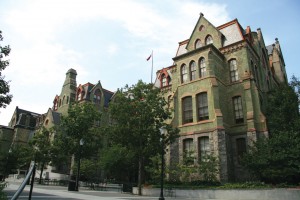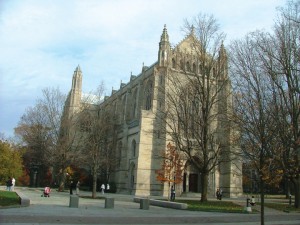 If you haven’t yet, do go online and read the most popular version of the founding of Stanford University. Whether it depicts the truth or not is questionable, but the tale of two bereaved parents, dressed in rags, hoping to dedicate the construction of a new building at Harvard University in memory of their only son (a Harvard student), is certainly moving. And in modern times it gets one thinking – what’s the importance of alumni for an institution?
If you haven’t yet, do go online and read the most popular version of the founding of Stanford University. Whether it depicts the truth or not is questionable, but the tale of two bereaved parents, dressed in rags, hoping to dedicate the construction of a new building at Harvard University in memory of their only son (a Harvard student), is certainly moving. And in modern times it gets one thinking – what’s the importance of alumni for an institution?
The world over, there have been instances galore where alumni associations have networked hard and long for the benefit of the alma mater. The spirit of giving back is a feeling that every student should experience in his or her lifetime, but of course it depends on several factors, including cultural influences. In western countries, the traditions and ceremonies surrounding events like graduation help to inculcate a sense of pride in one’s college or university. This extends well beyond graduation, and in turn, inspires alumni to stay connected to these institutions through out their lives.
For some reason, this culture has not developed in India, even after 65 years of independence. Here, students get admitted, spend their time at the college, graduate, and become busy with their personal and professional lives. The college he or she attended is forgotten! What remains, is attending the annual dinners and events hosted by the alumni association with the same friends, year after year. There is no affinity for the college, no incentive to donate, or even raise funds for the betterment of the institute.
Recently, though, the trend seems to be changing for the better. Prime institutes like the IITs and IIMs have a stronger alumni network than most institutes in the country and are trying to make a difference. IIT Madras has started a new trend of providing current students a chance to meet alumni and share views about career opportunities in the present work climate.
At many management colleges, distinguished alumni come back to lecture the students and share their expertise with their junior counterparts. It may not directly translate into any monetary benefit, but at least it’s a start. “I know that we need to do more,” says IIT Bombay alumnus Mandar Joshi, who graduated from the institute back in 2001. Still, he finds himself associating with it through seminars, alumni networking and other activities. “Unfortunately, we are not that equipped as to raise huge sums of money, and frankly speaking, devotion of time is an issue too,” he explains. That said, he is very optimistic that sooner or later, even if a decade or two down the line, the situation would have improved. He is quick to add that ten or twenty years is a very short period of time for India to catch up with stalwarts like Harvard or Oxford, but he’s quite positive that we are at least moving in that direction.
In fact, if there is any institute that has benefitted from donations of its alums, it is IIT Bombay. The alumni association has a GO-IITB Campaign each year, which enables it to raise funds to undertake many projects for the benefit of its students and faculty. The collections over the years have funded numerous scholarships, research grants and infrastructure projects on campus. In fact, the IITs have always been on the forefront
of facilitating the collection of such donations to their corpus funds. The returns have been so great that even the IIMs are finding it difficult to keep up. This could be attributed to the fact that the engineering institutes have created a breed of techno-entrepreneurs, many of which a based in the Silicon Valley. The management institutes have had no such luck. Donations converted from foreign currencies have the additional advantage of the high exchange rate! Of course, that does not mean efforts are not being made by the IIMs as well.
IIM Bangalore’s alumni association hosts Anusmaran, an event for alumni worldwide, and in 2010, saw a Chicogo-based graduate from the year 2000, pledge Rs. 1 Crore towards a unique institute initiative called the Center of Open Knowledge or COOK. It was to follow the broad principles of Open Courseware concepts developed at Massachusetts Institute of Technology (MIT), but use the innovations developed at Stanford University to ensure wider dissemination, engagement and monetisation of the knowledge that is being created at IIMB. In other cases, alumni have made efforts to maintain the reputation of their college. Several members of the Jai Hind College Alumni Association attended an event set up by the college with The National Assessment and Accreditation Council (NAAC) to share their positive experiences and help the college get a good grade in its accreditation. “It is imperative that the accreditation council received a holistic 360 degrees picture of the college and hence we had this interaction. I am proud to say it went very well, and we were awarded A grade,” says Hetal Kotak who used to work for the alumni association of the college.
All the efforts mentioned above, although have resulted in some of the largest donations, they are in no manner comparable to donations made regularly to universities abroad. It is a matter of contention that how can India come up to be at par with the rest of the world when Indian biggies give away their donation funds to non-Indian universities? Heavy-weights like Anand Mahindra, Ratan Tata and NR Narayana Murthy have all gifted money to Harvard University. In fact, when Tata made a $50 million donation to fund a campus building, it was “the largest international donation in the Ivy League university’s history.”
There have been instances galore of single donations, but the work of a network is something that India still needs. Well, at least, the process has started!
Some of the strongest associations in the world
 University Of Pennsylvania:
University Of Pennsylvania:
Any university that has Donald Trump and Warren Buffett (he is the the third richest man in the world!) has to call its alumni network powerful! UPenn has got it all – nine Nobel Laureates and several holding powerful offices in the world.
Harvard University:
Seven US presidents have held degrees from Harvard including Barack Obama, who studied law here. The alumni include political figures including presidents and prime ministers of countries like Israel, Taiwan, Colombia, Chile, Peru, Canada, and Mexico among others. Harvard has also played home to many Hollywood names, and of course Facebook creator, Mark Zuckerberg. Harvard’s reported endowment for 2010 is $27,557,404,000.
Yale University:
Three living US presidents attended Yale, namely George HW Bush, George W Bush, and Bill Clinton. With three current Supreme Court justices as alumni, Yale has the competitive advantage in the political scenario, not to mention the former presidents of the Philippines, Mexico and Germany. Some extremely powerful Hollywood personalities have also passed through Yale’s hallowed walls, including Meryl Streep, Jodie Foster, Claire Danes, Sigourney Weaver, Edward Norton, and Paul Giamatti.
 Princeton University:
Princeton University:
Another Ivy League University, Princeton, has seen three US presidents in its classrooms. The founder of Amazon.com, Jeff Bezos, graduated from Princeton among many other business leaders. Princeton has had a long association with Nobel Prize winner John Nash, and award winning writers like David Remnick, Toni Morrison, Joyce Carol Oates and F Scott Fitzgerald.
Columbia University:
As the fifth oldest university in the country, Columbia has racked up an impressive number of Pulitzer Prize, Nobel Prize, Academy Award, National Medal of Science and other award winners and members. In fact, this university has the highest number of Pulitzer Prize and Nobel Prize winners. Several senators, governors and Supreme Court Justices went to the university as well.
Volume 1 Issue 10



























